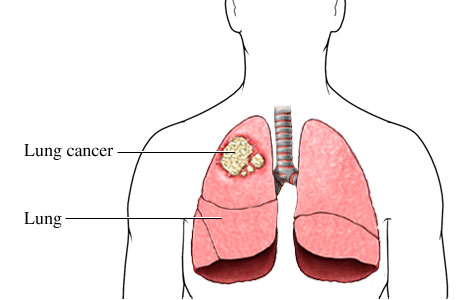Lung Cancer
Lung cancer is a type of cancer that begins in the lungs. Your lungs are two spongy organs in your chest that take in oxygen when you inhale and release carbon dioxide when you exhale.
 Lung cancer is the leading cause of cancer deaths in the United States, among both men and women. Lung cancer claims more lives each year than do colon, prostate, ovarian and breast cancers combined.
Lung cancer is the leading cause of cancer deaths in the United States, among both men and women. Lung cancer claims more lives each year than do colon, prostate, ovarian and breast cancers combined.
People who smoke have the greatest risk of lung cancer. The risk of lung cancer increases with the length of time and number of cigarettes you've smoked. If you quit smoking, even after smoking for many years, you can significantly reduce your chances of developing lung cancer.
Lung Cancer Causes
Lung cancer is the number one cause of cancer deaths in both men and women in the U.S. and worldwide.
Cigarette smoking is the principal risk factor for development of lung cancer.
Passive exposure to tobacco smoke also can cause lung cancer.
The two types of lung cancer, which grow and spread differently, are the small cell lung cancers (SCLC) and non-small cell lung cancers (NSCLC).
The stage of lung cancer refers to the extent to which the cancer has spread in the body.
Treatment of lung cancer can involve a combination of surgery, chemotherapy, and radiation therapy as well as newer experimental methods.
The general prognosis of lung cancer is poor because doctors tend not to find the disease until it is at an advanced stage.
Five-year survival is 40%-50% for early stage lung cancer, but only 1%-5% in advanced, inoperable lung cancer.
Smoking cessation is the most important measure that can prevent the development of lung cancer.




